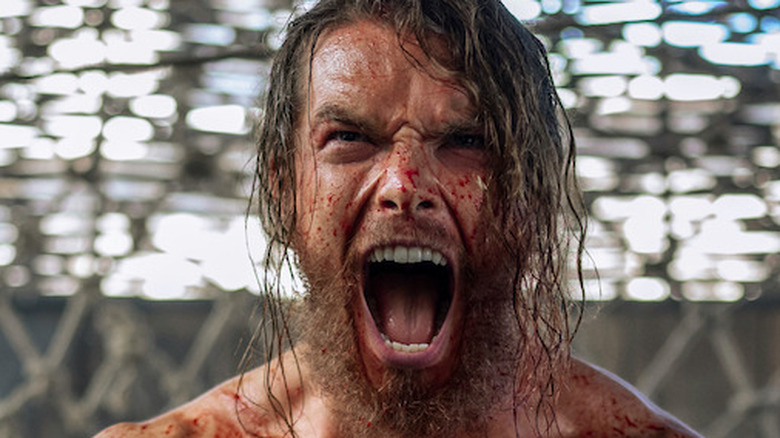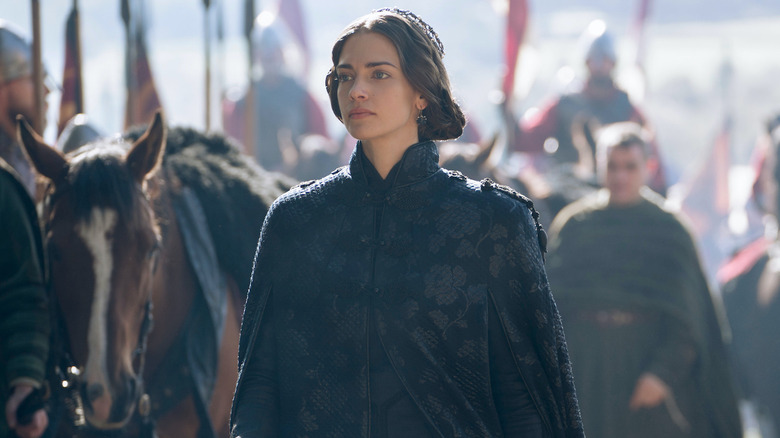How Vikings: Valhalla Creator Jeb Stuart Balanced Historical Accuracy And Creative Liberties In The Vikings Spinoff - Exclusive
Netflix's new series, "Vikings: Valhalla" boasts many characters that are well-known historical figures. From Norse explorer Leif Erikson (Sam Corlett) to Danish King Canute (Bradley Freegard), and from Viking warrior and Leif's sister Freydis Eriksdotter (Frida Gustavsson) to noble Earl Godwin (David Oakes), these are real people who played major roles in 11th century history.
With these notable characters in the mix, "Valhalla" creator Jeb Stuart had to ensure he told the story of what happened in the past without becoming so bound by it that the show was no longer entertaining. It's a fate he successfully avoided. Indeed, Stuart has created a fascinating universe of warriors and explorers, kings and queens, Christians and pagans. Yet while the story adheres to the broad outline of the historical period on which it focuses, it still takes plenty of creative liberties to ensure it tells an exciting tale.
Stuart spoke exclusively with Looper about what he kept in mind when working on "Vikings: Valhalla" that enabled him to integrate historical fact while still taking creative license.
Filling in the blanks of history on 'Vikings: Valhalla'
Jeb Stuart is responsible for writing some of the most popular action movies of all time, including "Die Hard" and "The Fugitive," however, in a recent interview with Looper, he confessed that, while he was always a fan of historical drama, he didn't get an opportunity to participate in one until Netflix's 2020 limited series "The Liberator." And it was on that show that Stuart learned a lesson that became key to his work on "Vikings: Valhalla."
As Stuart explained, "I think one of the interesting things about ['The Liberator'], in relation to this show is that, even though that took place in World War II, the telling of those stories varied from 1945 to — I think Felix Sparks [whose memories of his wartime experience were the basis for 'The Liberator'] died in the 2000s — he told that same story multiple times and it changed every time he told it."
This exposure to the way history is shaped by the teller allowed Stuart to feel more comfortable taking artistic liberties in "Valhalla" as well. "We don't really know the full story [of the Vikings]," Stuart noted. "We know that Harald went on this incredible journey throughout his life. We know that Leif Erikson went to the new world. How did he do it? What motivated him to do it? That's the gray area that I've learned from these shows to enjoy, to play in, to research, to focus on that part of it."
Stuart also pointed to the example of Emma of Normandy, a character on "Valhalla," to further explain his approach. "When I started digging into what we know about Emma of Normandy, a lot of what we know is because she hired her own biographer and told her story," Stuart observed. "She came over [to England] as a teenager, and by the time she was in her 20s, she was one of the richest women in Europe. How the hell did she do that? That's not reflected in some of her biography, so there must be some good stuff in there. You try to dig deeper in that and when you [find out] there's nothing there, you try to play in the gray area, knowing what you know about the historical period of the time."
The eight-episode first season of "Vikings: Valhalla" is now streaming on Netflix.

